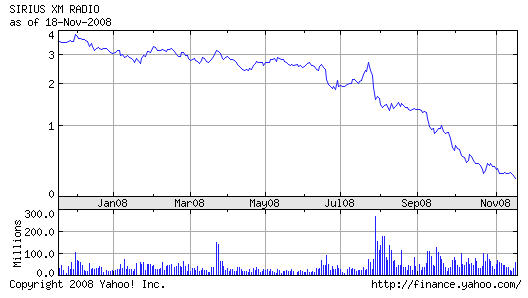The Woes of Satellite Radio

Eek! I thought I was getting such a bargain when I bought a bunch of Sirius stock a few years ago at $2.50 a share. I watched in delight as it rose to almost $8.00 after Howard Stern signed on. Well, it’s 2008, the economy is in the shitter, Sirius is now SiriusXM, and do you care to guess what the stock closed at today? $5.00? $3.00? $1.00?
Right, try $0.16. That’s s-i-x-t-e-e-n cents.
I’m starting to wonder if I’ll hear anything on my receiver when I start my truck six months from now. I’m wondering if this downward spiral can ever make a significant rebound.
Maybe it only truly appeals to a certain segment of society, primarily music lovin’ geeks like me. I LOVE my SiriusXM Satellite radio!! Granted, I’m sort of pissed about some recent consolidations of “redundant” stations that eliminated two of my favorites – Backspin and Sirius Disorder – but the selection of music (commercial-free) is so far better than terrestrial radio that you can’t even make the comparison.
I’m surprised satellite radio isn’t a lot more popular than it is. But given the economy, the availability of music on the internet (iTunes, music discovery sites like Last.fm, Pandora, and Rhapsody), music on smart phones, and the looming collapse of the U.S. auto industry – well, things ain’t looking so bright for SiriusXM.
Me? I’ll be subscribed until Satellite Radio is six feet under. Sorry, I need my variety of music. I need another way to discover new music. And dammit all, I need my Howard Stern!
You guys and gals are music lovin’ fools like me. Who can’t live without their satellite radio? Who could give a rat’s behind?
Sirius XM at 17 cents – look out below – Nov. 19, 2008 (CNN Money)



5 Comments
jb
I too am not wild about some of the changes that have come with the consolidation of Sirius and XM—the blues station seems to play a lot more electric, contemporary stuff and a lot less by the old masters; the classic jazz station seems to have cut back on the classic artists in favor of more contemporary folk as well. This is not necessarily bad, just something that will take getting used to. Those stations still have no competition in the terrestrial world.
bobella
I say buy more stock!
I had a free 3 month trial to XM that has since expired and I really do miss it. But like you said, with the economy in the dumps, people are more likely to cut out stuff like that. Maybe if it was a very inexpensive indulgence…like $5 a month I would sign back up. For some reason, $12 just seems more than I want to part with every month.
Steve
I feel your pain, investment-wise.
I can’t bear to look at my account statements any more…
As far as XM goes, I signed up and then found that I didn’t listen to it nearly as much as I thought I would.
Just give me my NPR on the way to and from work and I’m happy.
Bill C
Sirius is great for sports but I find that the channels I listen to (Spectrum, CoffeeHouse, Outlaw Country) seem to play a lot of the same music over and over.
Gonzo
This is sort of surprising to me. You’d think that after the merger, things would be looking up for satellite. But as you mention, the larger economic slump is at least partially to blame.
My prediction – XM/Sirius is on the way out. It may take a few years, but I don’t think it’ll be here for the long haul. With the FCC’s recent decision on the use of so-called white spaces in the TV spectrum for wireless tech., you’re going to see more wireless mobile devices on the market and in use. Baltimore is currently a test market for XOHM (http://www.xohm.com/), a mobile wi-fi service. Theoretically, this service would allow me to drive around town with my laptop, never losing connection. More services of this nature are likely.
And when THAT happens, you’ll see more devices such as car radios that are Internet compatible, letting you listen to any Internet radio service in your car.
Just a prediction, but that seems to be where we’re heading.